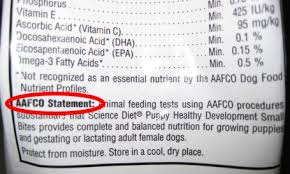3 questions every pet parent needs to ask about their pet food

We adore our pets, and want to keep them healthy and happy - and spoil them rotten sometimes. So we need to make sure that the food we give every day is nutritious and safe. The pet food market has exploded in recent years, and there are excellent foods available. But how to separate the truly great from the great marketing?
First, look for the teeny tiny letters "AAFCO" somewhere on the bag. Every bag of food must have an AAFCO statement by law.

-
If that statement reads "Animal feeding tests using AAFCO procedures show that [Name of Food] provides complete and balanced nutrition for ..." then you have found the gold standard. You are feeding good food that is proven to be digestible and nutritious.
- If the AAFCO statement reads: "[Name of Food] is formulated to meet the nutritional levels established by the AAFCO Dog/Cat Food Nutrient Profiles for all life stages" then it's probably time to change foods. Feeding a senior pet a food for "all life stages" is essentially feeding puppy/kitten food to your senior citizen. They have totally different nutritional needs!
- If the food is formulated for a specific life stage, like adult maintenance or for growth, then now it's time to pick up the phone.
Here are the 3 questions you MUST ask your pet food manufacturer. You won't find the answers on that beautiful glossy bag - look for the company's contact information and call their 1-800 number. The best answers according to the World Small Animal Veterinary Association nutrition committee are given.
1. Who formulates the food, and what are their credentials?
- PhD in animal nutrition or veterinarian board-certified in veterinary nutrition (if the answer is "our vets", probe a little deeper - I'm a veterinarian, but certainly not qualified to design my pet's food)
2. Does the diet meet AAFCO nutrient profiles by analysis of the finished product, or by analysis of the raw ingredients?
- Finished product analysis is superior since key vitamins can be destroyed during processing. The manufacturer should also be able to provide the exact amount of specific nutrients (like protein, phosphorus, sodium, vitamin D, etc), not just the guaranteed minimums or maximums listed on the bag. Just knowing the calorie content is not enough.
3. What specific quality and safety control measures do you use when manufacturing the food?
- Ingredients should be tested for toxins before being added to the batch of food, and the finished food should also be tested for toxins, bacterial contamination, and nutrient analysis
If you are satisfied with the answers to these questions, continue feeding with confidence. If you have any doubts after your call, switch brands. For example, the Hills (Science Diet) customer service representative was extraordinarily helpful and open about all the credentials of their employees and the extensive research and testing that goes into their foods. I had two horrible phone calls with a different brand whose reps refused to answer the questions and told me that "normal" pet parents don't ask these questions. So I encourage each and every one of you to hold your pet's food company accountable. Your pet deserves it.
Photo credit Lottie www.flickr.com
About the Business
Have a question? Ask the experts!
Send your question

